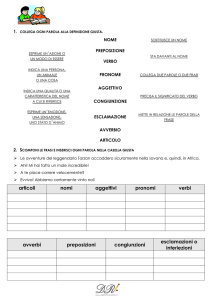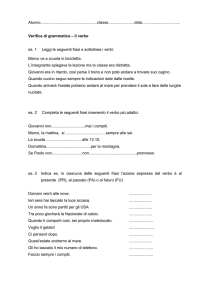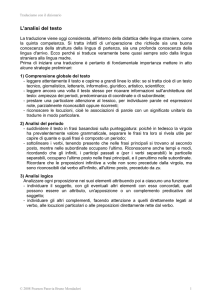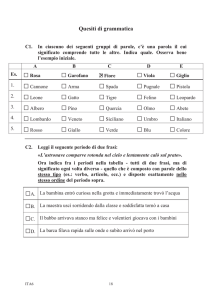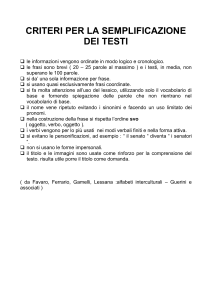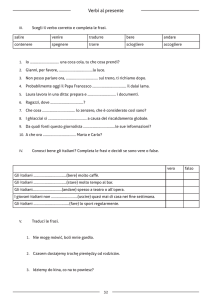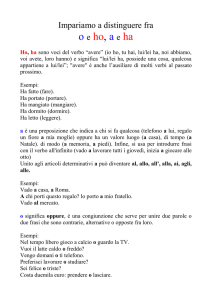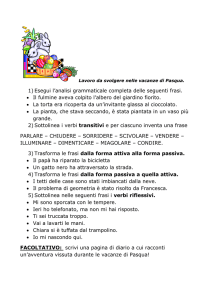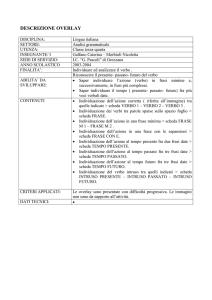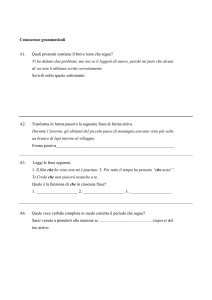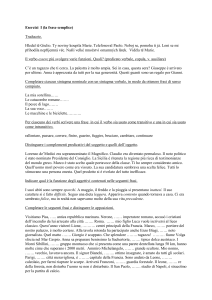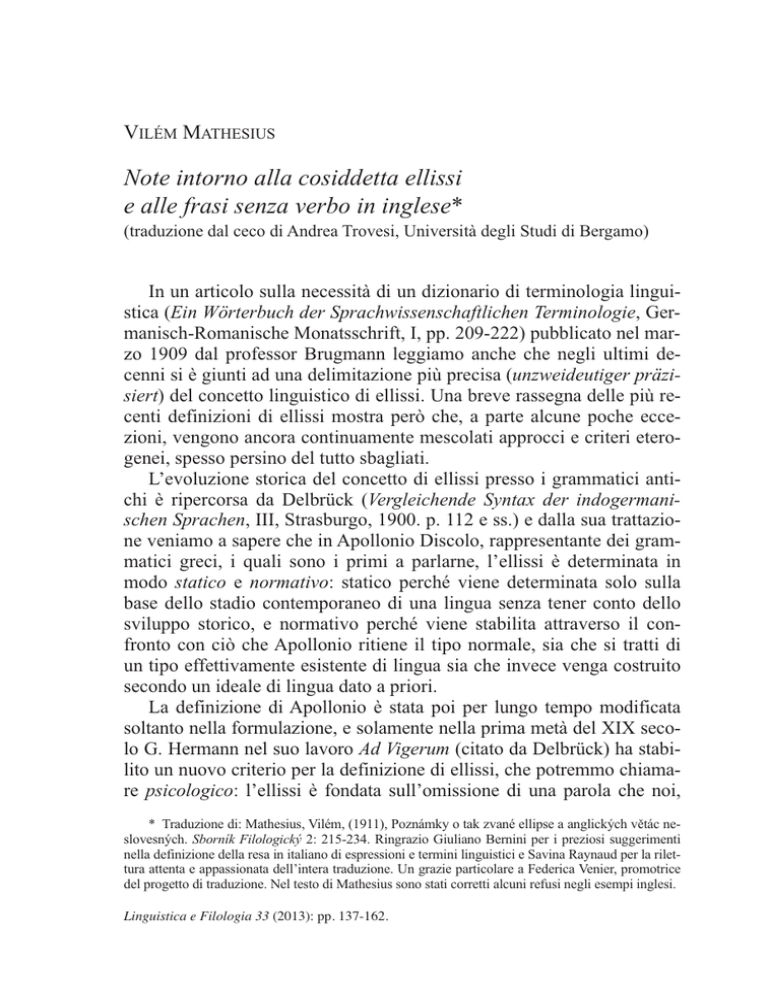
VILÉM MATHESIUS
Note intorno alla cosiddetta ellissi
e alle frasi senza verbo in inglese*
(traduzione dal ceco di Andrea Trovesi, Università degli Studi di Bergamo)
In un articolo sulla necessità di un dizionario di terminologia linguistica (Ein Wörterbuch der Sprachwissenschaftlichen Terminologie, Germanisch-Romanische Monatsschrift, I, pp. 209-222) pubblicato nel marzo 1909 dal professor Brugmann leggiamo anche che negli ultimi decenni si è giunti ad una delimitazione più precisa (unzweideutiger präzisiert) del concetto linguistico di ellissi. Una breve rassegna delle più recenti definizioni di ellissi mostra però che, a parte alcune poche eccezioni, vengono ancora continuamente mescolati approcci e criteri eterogenei, spesso persino del tutto sbagliati.
L’evoluzione storica del concetto di ellissi presso i grammatici antichi è ripercorsa da Delbrück (Vergleichende Syntax der indogermanischen Sprachen, III, Strasburgo, 1900. p. 112 e ss.) e dalla sua trattazione veniamo a sapere che in Apollonio Discolo, rappresentante dei grammatici greci, i quali sono i primi a parlarne, l’ellissi è determinata in
modo statico e normativo: statico perché viene determinata solo sulla
base dello stadio contemporaneo di una lingua senza tener conto dello
sviluppo storico, e normativo perché viene stabilita attraverso il confronto con ciò che Apollonio ritiene il tipo normale, sia che si tratti di
un tipo effettivamente esistente di lingua sia che invece venga costruito
secondo un ideale di lingua dato a priori.
La definizione di Apollonio è stata poi per lungo tempo modificata
soltanto nella formulazione, e solamente nella prima metà del XIX secolo G. Hermann nel suo lavoro Ad Vigerum (citato da Delbrück) ha stabilito un nuovo criterio per la definizione di ellissi, che potremmo chiamare psicologico: l’ellissi è fondata sull’omissione di una parola che noi,
* Traduzione di: Mathesius, Vilém, (1911), Poznámky o tak zvané ellipse a anglických větác neslovesných. Sborník Filologický 2: 215-234. Ringrazio Giuliano Bernini per i preziosi suggerimenti
nella definizione della resa in italiano di espressioni e termini linguistici e Savina Raynaud per la rilettura attenta e appassionata dell’intera traduzione. Un grazie particolare a Federica Venier, promotrice
del progetto di traduzione. Nel testo di Mathesius sono stati corretti alcuni refusi negli esempi inglesi.
Linguistica e Filologia 33 (2013): pp. 137-162.
Linguistica e Filologia 33 (2013)
anche senza pronunciarla, abbiamo in mente. Lo stesso Delbrück definisce l’ellissi secondo questi medesimi tre criteri: è possibile riconoscere
l’ellissi confrontando frasi concrete con un tipo ideale o [con] tipi ideali
di frasi la cui idea esiste dentro di noi. Che Delbrück concepisca l’ellissi
in modo puramente statico è evidente dalla sua riluttanza a parlare di ellissi attributiva, cioè del fenomeno che si può esemplificare con il mutamento červený šarlach [rosso scarlatto] > šarlach [scarlatto] (originariamente šarlach indicava una stoffa che poteva essere tinta con colori diversi, vedi Nyrop, Das Leben der Wörter, Lipsia 1903, p. 79). Le definizioni di Brugmann sull’ellissi, fornite nella sua Kurze vergleichende
Grammatik der indorgemanischen Sprachen (Strasburgo, 1902-4), sono
purtroppo sparse (cfr. nell’indice sub voce Ellipse, p. 709), ma se riunite
in una sintesi sistematica mostrano differenze sostanziali con quelle di
Delbrück. Con ciò non intendo l’ampliamento del materiale analizzato,
nel senso che Brugmann parla anche di ellissi dei suoni e di sillabe, bensì
differenze fondamentali. Tra queste, importante è il fatto che Brugmann,
accanto a una prospettiva statica, applica anche una prospettiva dinamica, storica, include cioè nel concetto di ellissi anche la dissimilazione
riduttiva e l’aplologia sillabica, fenomeni definibili sulla base degli
esempi indicati dal Brugmann solo attraverso la comparazione storica
dello stadio attuale di una lingua con uno stadio precedente. Ad ogni modo, Brugmann evita di accogliere in modo esplicito un punto di vista normativo e psicologico, e definisce con il nome di ellissi semplicemente un
fenomeno per cui a volte dalla consueta totalità dell’espressione (e non
tipo!) rimane inespressa una parte per il momento non indispensabile. Introducendo una prospettiva storica, Brugmann ha compiuto certamente
un passo importante verso una più precisa definizione di ellissi, ma non
avendo distinto nettamente tale prospettiva da quella statica non ha raggiunto la chiarezza auspicata. Tale riflessione è avvenuta al di fuori dei
circoli di linguisti comparatisti. A rendere decisiva la prospettiva esclusivamente storica era stato qualche tempo prima G. Krüger nello studio
pubblicato nel 1901 e 1902: Die Auslassung oder Ellipse (Herrigs Archiv, fascicolo 107, pp. 350-374; fascicolo 108, pp. 107-130), in cui
chiama ellissi un fenomeno identificato tramite l’analisi storica, per cui
alla forma di una struttura linguistica sembra talvolta necessario aggiungere un elemento scomparso senza il quale la struttura stessa non si sarebbe potuta formare. Secondo Krüger non si tratta affatto di ciò che ha
138
V. Mathesius, Note intorno alla cosiddetta ellissi e alle frasi senza verbo in inglese
in mente oggi il parlante nella produzione di tale struttura, bensì di come
quella struttura si è sviluppata. Diversamente, invece, H. Paul (Prinzipien der Sprachgeschichte4, Halle, 1909; §§ 218 e ss.) e in maniera ancor più radicale Wundt (Völkerpsychologie I, Die Sprache2, Lipsia 1904;
cfr. i punti del secondo fascicolo segnati nell’indice alla voce Ellipse),
senza tener conto dell’aspetto storico hanno contestato in modo esplicito
le consuete definizioni sull’ellissi nel senso statico: comprensibilmente,
Paul ha prestato maggiore attenzione al valore comunicativo, mentre
Wundt alla formazione a livello psicologico delle enunciazioni comunemente chiamate ellittiche. Anche nello studio più dettagliato su questo
problema, e cioè l’introduzione al libro pubblicato da K. Sundén nel
1904 a Uppsala: Contributions to the Study of Elliptical Words in Modern English, in cui l’autore analizza l’accorciamento di parole in inglese
(p.e. Samuel > Sam, etc.), è applicato un taglio storico. Qui Sundén definisce l’ellissi come un accorciamento storicamente determinabile, più o
meno fisso, di una precisa struttura linguistica e – con ciò ne fornisce
una nuova caratteristica – è un accorciamento consapevole o intenzionale, causato da motivi funzionali o economici, attivi nel discorso.
Questa breve rassegna delle più importanti definizioni di ellissi, che
ha permesso di stabilire le principali tendenze nell’osservazione della
questione, ha avuto l’obiettivo di fornire le premesse per una valutazione critica di una parte importante di materiale che in tale questione rientra: le frasi senza verbo in inglese.
Che la natura di queste frasi non sia ancora chiara nemmeno ai linguisti di più moderna impostazione lo dimostra lo studio di Jespersen, pubblicato sei mesi fa (The Rôle of the Verb, Germanisch-Romanische Monatsschrift III, pp. 152-157), in cui a tale riguardo questo famoso autore accanto al termine corretto “frasi senza verbo” (verbless sentences) parla ripetutamente di omissione del verbo, cioè di ellissi; quanto sia poi del tutto comune o molto comune ritenere ellittiche simili frasi lo dimostrano alcuni
altri nomi. Considerano infatti queste frasi come ellittiche anche Mätzner
(Englische Grammatik2, Berlino 1873-1875, II., p. 47 e ss., III., p. 19, 5152), Immanuel Schmidt (Grammatik der englischen Sprache 6, Berlino
1901. § 216: Der unvollständige Satz), G. Krüger (nel già indicato articolo
die Auslassung oder Ellipse; Schwierigkeiten des Englischen, Dresda e
Lipsia, III., 1904. §§ 2005 e ss.), Poutsma (A Grammar of Late Modern
English, I, Groninga, 1904-1905, capitolo: Elliptical Sentences), C. Al139
Linguistica e Filologia 33 (2013)
phonso Smith (Studies in English Syntax, Boston 1906, p. 3 e ss.). Kellner
(Historical Outlines of English Syntax 2, Londra 1905. §§ 81-82) dice in
effetti che apporre al soggetto un complemento predicativo è fenomeno
più antico dell’uso della copula, ma riguardo alle frasi senza verbo parla
sempre di ellissi. Sfortunatamente Sweet non tratta di queste frasi in modo
dettagliato (New English Grammar, Oxford, pubblicazione del 1900-3).
In linea con quanto detto sopra circa le definizioni di ellissi analizzeremo le frasi senza verbo sia dal punto di vista statico, cioè nell’inglese
moderno all’incirca da Shakespeare e senza tener conto della loro origine, sia dal punto di vista dinamico, e cioè nel loro sviluppo storico dal
periodo protogermanico.
I. Analisi statica
Le frasi senza verbo sono sempre classificate in base a quanto ciascun
linguista ritiene venga omesso. Solo molto di recente pochi linguisti si
sono espressi contro questo metodo classificatorio aprioristico e, come si
vedrà soprattutto in seguito, inesatto, distinguendo le frasi senza verbo
non rispetto a come apparirebbero se non fossero senza verbo, bensì rispetto alla loro forma concreta, al valore funzionale e a quello semantico
dei membri esistenti. Così ha fatto ad esempio Meillet nel suo importante
lavoro sulla frase nominale in indoeuropeo (La phrase nominale en indoeuropéen. Mémoires de la Société de linguistique de Paris, XIV, 19061908, p. 1-26, Sütterlin in paragrafi sparsi del suo studio sul nuovo tedesco (Die deutsche Sprache der Gegenwart3, Lipsia 1910), e da noi Baudiš con alcune singole osservazioni (Studie o perfektech, § 4, Věstník
Král. Č. Společnosti Náuk, tř. his. 1910). Ad oggi solo J. Haas nel libro
Neufranzösische Syntax (Halle 1909) ha classificato in maniera dettagliata e sistematica le frasi senza verbo di una lingua moderna. Per l’inglese
una simile classificazione non è ancora stata fatta.
In generale, dal punto di vista formale le frasi senza verbo dell’inglese possono essere distinte in frasi a un membro, cioè quelle che hanno
solo un centro di frase, e frasi a due membri, che hanno due centri di
frase. Tale divisione diverrà più chiara con gli esempi1).
1 Le fonti dei miei esempi in ordine cronologico inverso:
Wells, Kipps. The Story of a Simple Soul. 1905.
Fisher, The private Lives of William II and his Consort. 1904.
Shaw, Plays: Pleasant and Unpleasant. II. 1898.
140
V. Mathesius, Note intorno alla cosiddetta ellissi e alle frasi senza verbo in inglese
1. Frasi senza verbo a un membro
Le frasi senza verbo a un membro possono essere suddivise ulteriormente in frasi tetiche, che esprimono semplicemente l’esistenza di un
qualche fenomeno o idea, e frasi predicative, che enunciano una determinazione predicativa del soggetto logico dato dalla situazione ma a livello formale non espresso affatto oppure – è necessario aggiungere per
un piccolo, ma interessante, gruppo di frasi – perlomeno non da un centro di frase autonomo.
a) Frasi tetiche a un membro
Le frasi tetiche a un membro con valore semplicemente dichiarativo
non sono frequenti nel linguaggio parlato. Solitamente esprimono tempo, per esempio:
Half a jiff and I’ll tell you your mother’s Christian name. (Wells)
Half past nine, and Mr. Charles has not yet returned. (Boucicault, 1846)
Altre volte indicano senza alcuna determinazione ulteriore un’altra
idea che è al centro dell’attenzione:
[He (= the waiter) comes into the room, and meets the eye of Valentine,
who wants him to go]. All right, sir. Only the tea – things, sir. [taking
the tray]. Excuse me, sir. Thank you, sir. [He goes out]. (Shaw)
Spesso si tratta di locuzioni fisse:
Yes: that’s him: not a doubt of it. (Shaw)
Doyle, The Exploits of Brigadier Gerard. 1896.
Jerome, Three Men in a Boat. 1891.
Gissing, New Grub Street. 1891.
Mrs Ward, Rober Elsmere. 1888.
Mrs. Wood, East Lynne, 1861.
Dickens, Pickwick Papers. 1837-1839.
Austen, Sense and Sensibility, 1811.
Boswell, The Life of Samuel Johnson, 1791.
Swift, Journal to Stella. 1710-1713.
The Spectator. 1711-1712.
Ben Jonson, Epicoene; or, The Silent Voman. 1609.
Alcuni esempi di autori qui non riportati sono presi dalla grammatica di Mätzner.
141
Linguistica e Filologia 33 (2013)
Si tratta di frasi molto frequenti nello scritto. Gli scrittori le usano
volentieri per una rapida rappresentazione impressionistica della scena o
dell’azione.
Scena:
Eight flights of stairs, consisting alternately of eight and nine steps.
A sitting-room, a bedroom, a kitchen. But the kitchen was called diningroom, or even parlour at need.
A deep breath of country air. It is spring-time. (Gissing)
Night. A lady’s bedchamber in Bulgaria, in a small town near the
Dragoman Pass – – – – –. (Shaw)
Azione:
Pause. Kipps looked at her, and then was unable to look at her again.
He looks at it. Pause. Giggles, slight struggle, and a slap on Kipp’s coatsleeve. A passer-by appears down the path and she hastily withdraws her
hands.
Silence and the rustle of plans. He looked up and saw Ann’s eyes bright
with tears. (Wells)
Murmurs of delight and anxiety to join in the chorus. Brilliant performance
of prelude to the Judge’s song in “Trial by Jury” by the nervous pianist.
Moment arrives for Harris to join in. (Jerome)
Another silence. Then he overtook her.
The click of an opening gate. Catherine shook off her dreaminess at once,
and hurried along the path to meet her husband. (Mrs. Ward)
A few minutes and Isabel forgot her grievance.
A pause. Barbara’s eyes were fixed upon the moonlight.
An ominous sound of talking; the justices were evidently coming forth.
Another minute, and – the handle was in two.
Half an hour, and then Mr. Carlyle came petting up, passed the gates, and
turned on to grass.
A moment’s hesitation; for of course Mr. Carlyle was conscious that she
had. (Mrs. Wood)
Cheers. Loud cries of ‘No’. Vehement cheering. A cry of ‘It is’ and great
cheering. Great excitement.
A short pause, and he shouted out a doggerel rhyme. A minute’s silence,
and he murmured the burden of some roaring song. A short period of
observation, and he was wandering through a tedious maze of low-arched
rooms.
A bound, a splash, a brief struggle; there is an eddy for an instant, it
gradually subsides into gentle ripple... (Dickens)
142
V. Mathesius, Note intorno alla cosiddetta ellissi e alle frasi senza verbo in inglese
Molto spesso accade che frasi tetiche formalmente a un membro siano dal punto di vista del contenuto a due membri. Nel parlato accade infatti che le parole pronunciate esprimano l’esistenza di una qualche idea
al centro dell’attenzione del parlante e il modo con cui sono pronunciate
esprima il relativo predicato. Di tale fenomeno si era già accorto Dittrich (Konkordanz und Diskordanz in der Sprachbildung, Indogermanische Forschungen 25, 1909, pp. 1-27), che per questo distingue Lautungsbasis (= soggetto) e Lautungsmodulation (= predicato). Questo fenomeno si manifesta in modo massimamente chiaro nelle frasi esprimenti
un giudizio enfatico. In questi casi il centro della frase tetica viene
espresso con l’infinito, ad esempio:
The little beast!... To go and tell! Oh, if I had him here, I’d cream him with
chocolate creams till he couldn’t ever speak again! (Shaw)
He had never seen his wife so exasperated. To think what might have been,
what she might have done for the race...! (Mrs. Ward)
To have his love used so scornfully! And now to be so rewarded!
Poor fellow! To see him in a circle of strangers! (Austen)
Now, sir, to talk of respect for a player!
Damned rascal! To talk as he does of the Scotch! (Boswell)
Thou Judas, to offer to betray thy princess! (Jonson)
con un’espressione nominale, per esempio:
How dull it must be to have too much principle! Like a mill chocked with
corn. No bread because the machine can’t work!
“Tolerance!” he said with irritable vehemence – “tolerance! Simply
another name for betrayal, cowardice, desertion – nothing else.”
“Scholarship! Learning!” Eyes and lips flashed into a vehement scorn.
“You allow them a value in themselves, apart from the Christian’s test...”
(Mrs. Ward)
“It’s like a dream,” ejaculated Mr. Pickwick, “a hideous dream. The idea
of man’s walking about, all day, with a dreadful horse that he can’t get rid
of!” (Dickens)
The idea of an old fellow like me marrying a young kid!
The idea of cold meat without a pickle!
Simili sono le frasi in cui un fatto viene dichiarato con enfasi, ma al
contempo diverse – almeno secondo me – perché in queste la struttura a
due membri del contenuto non è evidente. Esempi:
143
Linguistica e Filologia 33 (2013)
And we ran on hopefully to the third one, and hallooed. No answer!
(Jerome).
“Wheels!” exclaimed Agnes. “Catharine, I suppose, home from
Whingborough.”
A sound of wheels! Roberts long legs took him to the gate in a twinkling.
(Mrs. Ward)
O the sea breaks in upon me! Another flood! An inundation! (Jonson)
Prossime alle frasi esprimenti un giudizio enfatico sono poi le frasi
tetiche esortative (imperative) e interrogative. Esempi del primo tipo:
“Heads, heads – take care of your heads!” cried out the loquacious
stranger. (Dickens)
No apologies, my friend. (Goldsmith)
No speaking one to another, or rehearing old matters! (Jonson)
A horse! A horse! (Shakespeare)
Tra queste colloco anche le frasi il cui centro è formato da un’espressione di misura:
But enough of myself and my affairs! (Shaw)
So, ladies, enough of business for one night. (Swift)
No more of him. (Jonson)
Esempi di frasi interrogative:
“Hello!” he said, “I’m off!” – “Business?” – “Yes.” (Wells)
Any injuries, Sergeant? (Doyle)
“Any luggage, sir?” Inquired the coachman.
“Dogs, sir?”
“Many conquests, sir? Inquired Mr. Tracy Tupman. (Dickens)
“No bad news, colonel, I hope?” said Mrs. Jennings.
“A dance?” cried Marianne. “Impossible!” (Austen)
Pardon me, sir, I must insinuate your errors to you; no gloves? no garters?
no scarves? no epithalamion? no masque? (Jonson)
Infine, è necessario qui indicare le frasi tetiche che in forma sintetica
esprimono in realtà un contenuto analitico. Così se informando di una
qualche sventura esclamo: Pover’uomo! uso una forma sintetica, una
struttura costituita da un solo centro formale, in realtà esprimo un pen144
V. Mathesius, Note intorno alla cosiddetta ellissi e alle frasi senza verbo in inglese
siero analitico: Come è sventurato [lett. povero] quell’uomo! oppure:
Quell’uomo è sventurato [lett. povero ]! Esempi analoghi sono:
Rum world! (Wells)
Six of you! – and you can’t find a coat that I put down not five minutes
ago!
Seven of you, gaping round there, and you don’t know what I did with the
hammer. (Jerome)
Newcome bent forward quickly. Strange glow and intensity of the fanatical
eyes – strange beauty of the wasted persecuting lips! (Mrs. Ward)
Poor John! Is he gone? (Swift)
b) Frasi predicative a un membro
Le frasi predicative a un membro sono molto frequenti nella lingua
parlata e scritta. Di solito esprimono una predicazione dichiarativa, e
ciò attraverso un’espressione nominale semplice, per esempio:
I was just ‘aving a look at this indicator. First class idea. Tells you all you
want to know. (Wells)
Quite the wisest thing you can do, my love.
Nonsense, sir: you can see that there is no one on the balcony.
Dear young lady: your servant to the death.
Why, how is it that you’ve beaten us? Sheer ignorance of the art of war,
nothing else.
Well said, Switzer.
Well, well, only a joke, little one. (Shaw)
“Most extraordinary thing I ever heard of,” said George. (Jerome)
“A curious little bit of social history,” said Elsmere.
“Not the answer of a bread-and-butter miss,” he thought to himself
amused, “and yet what a child it looks.”
Altogether a quiet, rural, English spot. (Mrs. Ward)
The first thing was to get her away from the room, for the great change was
approaching, and the parting struggle between the body and the spirit
might be one of warfare; no sight for her. (Mrs. Wood)
Only a bob’s worth, Tommy.
“Evidently a traveller in many countries and a close observer of men and
things,” said Mr. Pickwick.
“The other party, and a surgeon, I suppose,” said Mr. Snodgrass.
“Pleasant, pleasant country,” sighed the enthusiastic gentleman, as he
opened his lattice window. (Dickens.)
145
Linguistica e Filologia 33 (2013)
I must begin my 6th to MD as gravely as if I had not written a word this
month: fine doings, faith.
Impudence, if you vex me, I will give ten shillings a week for lodging.
I loitered at home, and dined with sir Andrew Fountaine at his lodging, and
then came home; a silly day.
I have the first floor, a dining loom and bed-chamber at eight shillings a
week; plaguy dear, but I spend nothing for eating.
I sat this evening with my friend Dartneuf, whom you heard me talk of; the
greatest punner of this town next myself. – – he is of Ireland: the Bishop
of Clogher knows him well; an honest, goodnatured fellow, a thorough
hearty laugher, mightily beloved by the men of wit; his mistress is never
above a cook – maid. (Swift)
The Gentleman next in Esteem and Authority among us, is another
Batchelor, who is a Member of the Inner Temple; a Man of great Probity,
Wit and Understanding; but he has chosen his Place of Residence rather
to obey the Direction of an old humoursome Father, than in pursuit of his
own Inclinations. (Spectator)
‘Heart, he’s come to invite me to dinner, I hold my life. – Like enough:
prithee, let’s have him up.
What do you think of the poets, sir John? – Not worthy to be named for
authors.
Well said, captain, i’ faith; well fought at the bul.
A good becoming resolution, sir, if you can put it on o’ the sudden.
(Jonson)
Sono particolarmente degne di nota alcune locuzioni fisse che talvolta acquisiscono significato avverbiale.
Poor thing! She looks very bad. No wonder. Ay, it is but too true. (Austen)
No wonder, sir. (Boswell)
– – now I am writing to saucy MD; no wonder, indeed, good boys must
write to naughty girls. (Swift)
That’s superstitious too. – No matter, master parson. (Jonson)
E poi le frasi predicative espresse dal solo participio:
Going to be very good to poor old papa just for one day after his return
from the wars, eh?
Spoiling your korates (curates), as usu’l, James.
Yes, Mr. Morell. Coming. (Shaw)
“Going to clear up, d’ye think?” (Jerome)
He then cried out, “Coming, sir!” though nobody called. (Fielding)
146
V. Mathesius, Note intorno alla cosiddetta ellissi e alle frasi senza verbo in inglese
Costruite alla stesso modo e parecchio frequenti sono le frasi predicative interrogative:
“Hullo, Kipps!” cried Sid, “spending the millions?” (Wells)
Been asking a lot of questions? (Shaw)
“Philosopher, sir? Poet, sir? Sportsman, sir? (Dickens)
How now! What ails you, sirs? dumb? (Jonson)
Ho trovato solo un esempio dove il predicato è formato da un’espressione avverbiale:
Off to work? (Shaw)
Diversamente, le frasi imperative e esortative formano un gruppo
ben definito, in cui la predicazione è solitamente espressa con un avverbio o con un caso preposizionale oppure con un infinito.
Esempi con avverbio:
Up and after them!
On, on, my friends! (Dickens)
Here he comes; in quickly. (Jonson)
Importanti a questo proposito sono i casi in cui l’avverbio o il caso
preposizionale sono accompagnati da un’ulteriore espansione complementare che per le sue caratteristiche formali potremmo chiamare oggetto della funzione verbale nascosta nell’avverbio. Sono importanti
perché qui con la stessa forma possono essere espresse due cose: o l’oggetto formale è anche oggetto logico oppure esprime anche il soggetto
logico dell’intera frase.
L’espansione complementare esprime l’oggetto logico:
Now, out with it!
Out, then, into the night with me! (Shaw)
Ods so! Off with his spurs, somebody.
Nay, out with it, sir John. (Jonson)
L’espansione complementare esprime il soggetto logico:
Away with you!
Now, off with you to the park, and write your poem.
147
Linguistica e Filologia 33 (2013)
Off with you and get some fresh coffee. (Shaw)
Down with you! (Dickens)
Con caso preposizionale:
And now to business ! (Shaw)
To horse, sir, to horse! (Dickens)
Now to Stella’s little postscript.
Well, now I will write and think a little, and so to bed, and dream of
MD.
Now for your saucy good letter; let me see, what does it say?
So now to your letter, brave boys. (Swift)
To cabin: silence!
To horse, to horse! (Shakespeare)
A volte avverbio e caso preposizionale vengono uniti:
Out of my house..., thou viper! (Congreve)
Now out upon him, prodigious creature! (Jonson)
La predicazione è espressa dall’infinito:
To return, however, to this same critical moment of Sir Mowbray’s offer.
Robert at the time was a boy of sixteen, doing very well at school, a
favourite both with boys and masters. (Mrs. Ward)
If I can hear the sermon, to attend it, unless attention be more troublesome
than useful. (Boswell)
So much for supper: and now to see that our beds are aired. (Goldsmith)
2. Frasi senza verbo a due membri
Queste frasi sono molto frequenti soprattutto nel linguaggio parlato
come frasi dichiarative.
In questi casi il predicato è espresso:
l. da un nome semplice:
All of it, too, quite avoidable trouble, you know, that is not avoided
because of the cheapness of the genteeler sorts of labour and the dearness
of forethougt in the world.
My heartburn still very bad. (Wells)
148
V. Mathesius, Note intorno alla cosiddetta ellissi e alle frasi senza verbo in inglese
On both occasions I acted conscientiously, and told my patients the brute
truth instead of what they wanted to know. Result, ruin. (Shaw)
It is just as suitable as Beauty and the Beast in the childrens’story. She, a
highborn beauty, brought up to revel in expense, in jewels, in feasts, in
show; and he, a-a-a- dull beau of a lawyer, like the beast in the tale. (Mrs.
Wood)
All a mistake.
Nothing like raw beef-steak for a bruise, sir; cold lamp-post very good, but
lamp-post inconvenient.
“Oh, I don’t know,”, said the jolly old gentleman; “all very natural, I dare
say.” (Dickens)
Maybe she is ill in town; nothing in the world more likely, for I have a
notion she is always rather sickly. (Austen)
“Sir, he wants only to tell his history, and to tell truth; one an honest, the
other a laudable motive.” (Boswell)
The first of our Society is a Gentleman of Worcestershire, of antient
Descent, a Baronet, his Name Sir Roger de Coverly. (Spectator)
A questo riguardo è necessario sottolineare che il soggetto pronominale viene solitamente posto alla fine della frase. Per esempio:
Wonderful thing that! (Wells)
And now, lo! down... there come toward us, laughing and talking together
in deep guttural bass, a half-a-score of stalwart halbert-men – Barons’ men,
these – and halt at a hundred yards or so above us.
“Ah!” said the old gentleman, following the direction of my gaze, “fine
fellow that, ain’t he?”
“Good-sized trout, that,” said George, turning round. (Jerome)
“More simpleton she!” echoed Joyce. (Mrs. Wood)
“Very extraordinary boy, that,” said Mr. Pickwick, “does he always sleep
in this way?”
“Delightful situation this,” said Mr. Pickwick
“Reg’lar good land that,” interposed another fat man.
“Much use that,” growled the fat gentleman, (Dickens)
Very dreadful that.
Tut, a device, a device, this! it smells rankly, ladies. (Jonson)
È chiaro che tale ordine delle parole deriva da un’aggiunta successiva del soggetto in condizioni di predicato fortemente evidenziato (buone considerazioni su questa spiegazione sono in Wegener in Untersuchungen über die Grundfragen des Sprachlebens, Halle 1885). Ciò può
149
Linguistica e Filologia 33 (2013)
essere osservato con maggior chiarezza in quei casi ancor più rari in cui
il soggetto posposto è espresso da un sostantivo, per esempio:
A cunning knave this second king of Prussia, and his august example was
not entirely lost upon his successors, as the case under consideration
shows. (Fisher)
Very nice family, Mrs Clandon’s, sir, (Shaw)
A sharp man, though, this Anstey, to hit upon such a scheme. (Mrs. Wood)
Smart chap that cabman. (Dickens)
I casi però in cui il soggetto posto alla fine della frase è espresso da
un infinito non possono essere chiariti con la spiegazione dell’aggiunta.
Qui forse l’ordine delle parole è derivato per analogia con frasi con verbo simili:
Better not interfere, dear young lady.
Just like anarchist not to know that they can’t have a parson on sunday.
No huse a – talking to me. (Shaw)
No use to discuss it further. (Mrs. Ward)
Il motivo per cui il soggetto espresso da una frase intera viene posposto è certamente proprio la sua natura frasale.
No matter how far – fetched a charge, and how conclusive it’s refutation,
some little thing – the shadow of a doubt – always cleaves to the accused
innocent. (Fisher)
Strange that Nature’s voices all around them – – – – should not have taught
them a truer meaning of life than this. (Jerome)
Strange – strange that she should make the acquaintance of those two men
in the same day. (Mrs. Wood)
– – a great piece of friendship indeed, what you heard him tell the Bishop
of Clogher. (Swift)
No marvel if the door be kept shut against your master, when the entrance
is so easy to you. (Jonson)
Nell’ultimo di questi esempi il valore di soggetto della frase subordinata non è più così evidente.
Tale valore è del tutto opinabile nell’antica locuzione no marvel
though, per la quale W. Franz (Shakespeare Grammatik2, Heidelberg
1909, § 576) riporta questi esempi da Shakespeare:
150
V. Mathesius, Note intorno alla cosiddetta ellissi e alle frasi senza verbo in inglese
No marvel, my lord, though it affrighted you.
No marvel then, though he were ill affected.
– no marvel though Demetrius do, as a monster, fly my presence thus.
2. Il predicato è espresso da un participio, per esempio:
No legacies needed by him. (Wells)
Trooper Jones’s horse hit with a pistol bullet on the fetlock. (Doyle)
“All the servants gone too!” he said presently, looking up and listening.
(Mrs. Ward)
Richard stamped his foot. “Ay, and all owing to my cursed cowardice...”
“The cook’s gone.” “The cook gone!” repeated Mr. Carlyle. (Mrs. Wood)
Search made everywhere. (Dickens)
We have great news just now; Madrid taken and Pampelunea. (Swift)
Con un altro ordine delle parole:
Agreed, finally, that we should take three bath towels, so as not to keep
each other waiting. (Jerome)
3. Il predicato è espresso da un’espressione avverbiale di luogo:
They’re stiff and rather silly, and dreadfully narrow, and not an idea in a
dozen of them. (Wells)
Mockery, mockery everywhere: everything I think is mocked by
everything I do.
Salt at your elbow, sir.
Tickets downstairs at the office, sir. (Shaw)
Water-wheels, inventors, steam-engins – and the lumpish lad all in a glow,
talking away nineteen to the dozen.
He looked down upon her with an indescribable mixture of feelings. No
stiffness, no coldness in her manner – only the even gentleness which
always marked her out from others.
She tried the lock; it yielded, and they entered. No one in the kitchen.
Oh, that queer musical novel – I know it quite welI. No sign of it here.
Wheels on the road! Mrs. Thornburgh woke up with a start. (Mrs. Ward)
You told me you were not coming. Some bachelors’ party in the way.
One of the servants appeared, showing in Mr. Carlyle: nothing false or
heartless about him.
None of the Thorns there that I know. (Mrs. Wood)
151
Linguistica e Filologia 33 (2013)
“Tickets at the bar, sir,” interposed the waiter. (Dickens)
Oh, ‘tis a nice place! A butcher hard by in the village, and the parsonage
house within a stone’s throw. (Austen)
More company below... shall I show them up? (Goldsmith)
4. Il predicato è espresso da un’espressione avverbiale di direzione:
It was only a little kettle, but it was full of pluck, and it up and spit at
him. (Jerome)
– – mothers’ head- off. – – – somebody else’s head off there, eh, sir?
– – – and she off with a rattle like a pas-de-charge. (Dickens)
I up and say.
A volte però nell’inglese moderno simili avverbi diventano veri e
propri verbi, acquisendo desinenze di persona e tempo adeguate. A pag.
20 del libro sopraccitato Sundén ne riporta degli esempi:
So I ups and tells him a piece o’ my mind. (anno 1852)
Our good Queen ups and says, says she... (anno 1902)
And the robber Chiftain offed (anno 1902).
Se in questo modo si può a volte venire a creare incertezza se si tratta
di una frase senza verbo con predicato avverbiale o di una frase con verbo
derivante da ipostasi con l’avverbio, è d’altra parte talvolta dubbio se la
frase senza verbo con una tale struttura sia a uno o due membri. Nella frase di Swift: Great news from Spain possiamo, credo, considerare l’espressione from Spain piuttosto come attributo al sostantivo news, anziché come secondo centro di frase, e quindi è chiaramente una frase tetica a un
membro. Nello stesso modo, nella frase dallo Spectator: Oho, Doctor, rare News from London, (says he); the Spectator has made honourable
Mention of the Club. Sarà l’analisi della prosodia di frase a permettere di
trovare il criterio più affidabile a soluzione di questo problema.
5 Il predicato è espresso da un’espressione avverbiale di tempo:
This is the coolest day we have had this winter: twelve degrees of frost
this morning. (Sweet)
The war over! (Shaw)
No adventure at all to-day.
152
V. Mathesius, Note intorno alla cosiddetta ellissi e alle frasi senza verbo in inglese
A terrible storm last night: we hear one of your packet boats is cast away.
(Swift)
Never a time that the courtiers or collegiates come to the house, but you
make it a Shrove-Tuesday! (Jonson)
6. Il predicato è espresso da un’espressione avverbiale di modo:
Thus Mr. Chester Coote, as he was on the evening when he came upon
Kipps. (Wells)
All this, of course, with the delicate nose well in air. (Mrs. Ward)
Other maidens confess to a hope of being, sometime or other, solicited to
abandon their father’s name, and become somebody’s better half. Not so
Miss Carlyle: all who had approached her with the lovelorn tale, she sent
quickly to the right about.
For the first time in his life Mr. Carlyle took possession of the pew
belonging to East Lynne... Not so Miss Carlyle: she sat in her own. (Mrs.
Wood)
She left the house without any wish of knowing them better. Not so the
Miss Steeles. (Austen)
Unica è la seguente costruzione tratta da Jerome:
None of your “Yes, sir, I will send them off at once: the boy will be down
there before you are, sir!” and then fooling about on the landing-stage,
and going back to the shop twice to have a row about them, for us. We
waited while the basket was packed, and took the boy with us.
Le frasi esclamative vengono a volte inserite nella categoria precedente perché in parte formalmente indistinguibili dalle frasi dichiarative. Accanto a queste vi sono tuttavia alcuni tipi particolari di frasi senza
verbo esclamative con le quali viene espresso stupore diffidente, ironico
o adirato, generato dall’unione concettuale espressa da soggetto e predicato. Si tratta specialmente di frasi in cui il predicato è espresso con
l’infinito, per esempio:
I, Raina Petkoff, tell lies! (Shaw)
She, an earl’s daughter, so much better born than Emma Mount Severn, to
be thus insultingly accused on the other’s mad jealousy.
The senseless idiot to go and marry Mount Severn’s expensive daughter!
(Mrs. Wood)
153
Linguistica e Filologia 33 (2013)
“She ask my pardon, poor woman!” cried Charles, “I ask hers with all my
heart!” (Macaulay)
He, Doctor Slammer, of the 97th, to be extinguished in a moment by a
man whom nobody had ever seen before, and whom nobody knew even
now! (Dickens)
I wonder how you could think of such a thing. I write to the doctor, indeed!
Colonel Brandon give me a living! Can it be possible? (Austen)
Pshaw! this fellow here to interrupt us! (Goldsmith)
The only talking sir in the town! Jack Daw! and he teach her not to speak!
And yet the noble Sidney live by his (verses), and the noble family not
ashamed. (Jonson)
A maid and be so martial!
Lewis marry Blanch! O boy, then where art thou? (Shakespeare)
Alla prima persona singolare e plurale, però, nel caso in cui non sia accompagnato dalla preposizione to, l’infinito non può essere distinto dall’indicativo; tuttavia, può essere riconosciuto come tale per analogia con
la terza persona singolare dove è del tutto evidente che si tratta di infinito:
Altrove il predicato nominale è accompagnato da un soggetto reso
solitamente da un pronome, per esempio:
Me a scoundrel, mind you!
I brave!
You like his father!
And you a solicitor! (Shaw)
And you eighteen years of age! (Mrs. Wood)
You a captain, you slave! (Shakespeare)
Il soggetto può anche essere nominale e in tal caso la frase non si
differenzia formalmente da una frase dichiarativa. Per esempio:
“Married to another! married to another!” she moaned, as she went down
the stairs, “and, that other, her!” (Mrs. Wood)
Doctor Slammer – Doctor Slammer of the 97th rejected! (Dickens)
The Dean friendly! (Swift)
When were you there? – Last night: and such a Decameron of sport fallen
out! Boccace never thought of the like. (Jonson)
Nelle frasi esclamative in cui con un predicato accompagnato da un
avverbio interrogativo si esprime meraviglia il soggetto sta solitamente
in fine di frase:
154
V. Mathesius, Note intorno alla cosiddetta ellissi e alle frasi senza verbo in inglese
What a nasty, uncomfortable thing to say to me! (Shaw)
How rude of them to go on like that, with a perfect stranger too! Oh,
how tiresome of you to let it all out! (Jerome)
Sulle frasi senza verbo dichiarative e esclamative a due membri è necessario aggiungere ancora alcune considerazioni. Nello studio citato al
§4, Baudiš accenna al fatto che la frase a due membri si è sviluppata
probabilmente da due frasi a un membro. Faccio notare che nell’inglese
moderno è possibile trovare esempi di due frasi a un membro – tetiche e
predicative – una che segue l’altra e così legate dal punto di vista del
contenuto che se fossero pronunciate insieme verrebbe a crearsi una frase senza verbo a due membri regolare.
Master! back from the war!
The Swiss! – A man worth of ten of you. (Shaw)
“Tolerance!” he said with irritable vehemence – “tolerance ! Simply
another name for betrayal, cowardice, desertion – nothing else – – (Mrs.
Ward)
Prossima alla frase predicativa a un membro e alla frase a due membri a volte capita di trovare un’altra forma di predicazione senza verbo,
l’apposizione. Per esempio:
Round her waist was a very broad girdle of gold, plates of gold riveted
together with hinges and stuck with sard and emerald... (Hewlett, Fond
Adventures)
Questo tipo di predicazione è particolarmente interessante se l’apposizione definisce non il solo nome bensì l’intera frase, per esempio:
He had driven Warwick out of England with so little trouble that he vainly
imagined that the earl’s power had been overrated – a grievous mistake;
he had only triumphed without a battle, because he had caught his enemy
unawares. (Political History of England, ed. by W. Hunt and R L. Poole, IV)
He has checked the graft of officials, collected taxes from the rich and
powerful, stopped the squandering of public funds, brought the payment
of governrnent salaries up to date, and afforded protection to commerce;
things never before done in Persia in the memorv of living men. (Times,
1911)
155
Linguistica e Filologia 33 (2013)
Se ci abituiamo presto a analizzare le frasi senza verbo a due membri, capiremo che è molto facile percepire le varie costruzioni assolute
come frasi senza verbo dipendenti. Haas parla in effetti di frase senza
verbo secondaria in francese, per esempio in questo stralcio: La pièce
entre nos mains, le gouvernement n’a eu qu’un souci: faire condamner
un traître. Le percezioni individuali qui certamente differiscono: di nuovo, criteri affidabili per la determinazione del valore frasale di queste
costruzioni potranno venire solo da una fine analisi della struttura fonetica della frase.
Per questo mi accontenterò qui solo di alcuni confronti che renderanno più chiara la questione:
Dinner over, Miss Carlyle beguiled Barbara out of doors. (Mrs.Wood)
The war over. (Shaw)
Rose drove up in fine style, a thin dark man beside her. (Mrs.Ward)
Nothing false or heartless about him. (Mrs. Wood)
Langham took the volumes reverently from Robert’s hands into his own,
the scholar’s passion hot within him. (Mrs. Ward)
My heartburn still very bad. (Wells)
Nelle frasi ottative il predicato è di solito reso da un’espressione preposizionale. Per esempio:
All the others hide round corners, and merely peep at the river down one
street: my thanks to them for being so considerate and leaving the riverbanks to woods and fields and waterworks.
We have had a pleasant trip, and my hearty thanks for it to old Father
Thames! (Jerome)
O, pox on your spelling of Latin.
My duty to the Bishop of Clogher.
My service to the Dean, and Mrs. Walls, and her Archdeacon.
Pox on these declining courtiers! (Swift)
Woe to the land!
The pox upon her green-sickness!
A pox o’ your throat! (Shakespeare; per altri esempi di questa locuzione
cfr. Franz, § 500)
Con un’espressione avverbiale viene reso il predicato in frasi imperative proprie. Per esempio:
156
V. Mathesius, Note intorno alla cosiddetta ellissi e alle frasi senza verbo in inglese
“Now, boys!” cried the landlord, “chaise and four out, make haste!”
(Dickens)
Chairs here! (Goldsmith)
Whip out behind me suddenly, and no anger in your looks to your
adversary. (Jonson)
La necessità viene espressa solitamente dall’infinito con la preposizione to. Per esempio:
Should the ticket not be delivered on the day after the expiration, the
deposit to be forfeited to the Company
Should the ticket not be so produced, the holder to pay the ordinary fare.
(Scritte sui biglietti di viaggio)
Trooper Jones to go with us. (Doyle.)
Charles Lillie to be taken Notice of.
No man to be an Hero of a Tragedy under six Foot.
My next Coat to be turn’d up with Blue. (Spectator)
Anche qui però la natura a due membri non è sempre scontata: si può
infatti a volte considerare l’infinito con la preposizione to come attributo del nome che esprime il soggetto. Di ciò non ho trovato alcun esempio evidente, ma certamente tutti percepiscono che c’è una qualche differenza tra le frasi appena riportate e le seguenti:
Nothing to do but turn the handle, and it would write a beautiful love letter
for your straight off, eh? (Shaw)
“Nothing more to arrange, I think,” said the officier. (Dickens)
Nelle frasi interrogative il predicato è di solito un nomen semplice,
per esempio
Tooth bad? (Shaw)
“The justices!” uttered Barbara, in alarm, “and papa one? ...?” (Mrs.
Wood)
Whose footsteps these? (Young)
Oppure un participio
I say, Sid. You going ‘ome?
You doing anything?
157
Linguistica e Filologia 33 (2013)
You going t’Boulogne?
You going in? (Wells)
Eye damaged, sir? (Dickens)
Oppure infine un’espressione avverbiale:
You still in the drapery? (Wells)
Tra le frasi interrogative a due membri inserisco anche frasi di questo tipo:
Why not shout for him?
Then why not send it to her husband instead of to me? (Shaw)
Se riguardiamo i diversi tipi di frasi senza verbo del neoinglese, riportati, descritti e classificati alle pagine precedenti, vediamo che in base alla
loro frequenza e varietà tali frasi non possono assolutamente essere considerate un fenomeno inconsueto nell’inglese moderno. Già da ciò ne risulta indebolito qualsiasi tentativo di dimostrare, a dispetto di obiezioni
sostanziali, che la natura ellittica di queste frasi sia da ascrivere all’esistenza di una qualche norma linguistica data a priori. Prendiamo però in
considerazione un criterio analogo, ma scientificamente accettabile, di
norma, e cioè il criterio psicologico: percepisce il parlante pronunciando
simili frasi che parte della frase intesa rimane inespressa? E qui, credo, la
risposta è negativa. Il cambiamento sopra riportato dell’avverbio predicativo in verbo mostra già che qui ad essere percepito come vero predicato
è l’avverbio e non un qualche predicato verbale inespresso. Se possediamo sufficiente sensibilità linguistica in inglese ce ne possiamo convincere direttamente con frasi in inglese stesso, altrimenti indirettamente con
frasi analoghe in ceco, che di per certo nessun parlante avveduto considererebbe incomplete per motivi formali. È infatti così evidente la differenza da questo punto di vista tra le frasi senza verbo e la vera aposiopesi,
dove c’è e si sente un’incompletezza del tutto evidente! Qualcuno potrebbe tuttavia far notare che nel linguaggio esistono coppie di frasi che si distinguono solo in base al fatto che in una c’è il verbo e nell’altra no. Dai
testi da me usati posso in effetti riportare due coppie di questo tipo:
The war’s over. – The war over! (Shaw)
The cook’s gone. – The cook gone! (Mrs. Wood)
158
V. Mathesius, Note intorno alla cosiddetta ellissi e alle frasi senza verbo in inglese
Ma se partendo della prima frase volessimo provare l’ellitticità della
seconda dovremmo prima dimostrare la loro identità formale, e perché
ciò sia possibile dovremmo presupporre che il verbo nelle frasi della seconda colonna sia stato omesso: insomma, un circolo vizioso. Ciò però
vale per la loro identità formale – perché, a parte il diverso accento psicologico, quella semantica è del tutto evidente – e quindi qui è necessario mostrare che è di forma linguistica che si tratta. Questo è importante
anche per un’altra ragione. Sundén infatti, che nel libro già più volte citato rifiuta di chiamare frasi ellittiche le frasi senza verbo, afferma però
che il motivo della loro diversità dalle frasi verbali è un’analisi insufficiente dell’idea complessiva che si intende esprimere, la quale è secondo Wundt alla base di ogni frase. Se sostituiamo l’epiteto “imperfetto”,
che ha il sapore di un giudizio, con l’epiteto “diverso”, questo punto di
vista può essere accettato per le frasi tetiche ad un membro, ma mi pare
del tutto indimostrabile per gli altri tipi di frasi senza verbo qui riportati.
Non possiamo infatti giudicare semplicemente dalla forma linguistica la
modalità del pensare, perché la modalità del pensare e la forma linguistica del linguaggio non coincidono. La ricchezza dei fenomeni della
nostra vita interiore che in generale si riescono a esprimere si scontra
con la potenzialità espressiva di una data lingua, così che spesso possiamo descrivere un medesimo fenomeno con varie strutture linguistiche
e altre volte invece – e non meno spesso! – per insufficienza di strumenti linguistici espressivi o come risultato della loro automatizzazione
dobbiamo descrivere diversi fenomeni con la stessa struttura. Questo
scontro, che spiega la lotta di poeti e scienziati per riuscire a esprimere
emozioni e pensieri con precisione massima, rende anche impossibile
giudicare a priori dalla forma delle frasi senza verbo in che modo venga
analizzata l’idea complessiva. Le coppie di frasi sopra riportate mostrano che proprio al contrario in entrambe l’analisi dell’idea complessiva è
la stessa e che invece la diversa forma delle frasi è il risultato o di disposizioni d’animo differenti o del fatto che entrambe le forme a quel
tempo appartenevano effettivamente alle possibilità espressive dell’inglese moderno. Possiamo capire qual’è la differenza tra una struttura
possibile e una impossibile in una data lingua se confrontiamo per
esempio una frase ceca scorretta, prodotta da qualcuno che non sa il ceco: Já nemluvit česky [io non parlare ceco] = Ja nemluvím česky [io non
parlo ceco] con una frase analoga dal punto di vista formale Já tam být,
159
Linguistica e Filologia 33 (2013)
to by bylo dopadlo jinak [esserci stato io là (lett. io là essere), sarebbe
andata diversamente] = Kdybych já tam byl býval, to by bylo dopadlo jinak [Se ci fossi stato io là sarebbe andata diversamente]. Per quanto riguarda invece l’aspetto psicologico delle frasi senza verbo è evidente da
quanto già indicato sopra che si usano specialmente nel linguaggio enfatico, in risposte rapide o per la rappresentazione sintetica di scene e
azioni, sia che ciò sia dovuto a finalità artistiche che a motivi di economia linguistica. Oltre a ciò sembra tuttavia che l’uso di simili frasi sia
un tratto legato a caratteristiche individuali. Ricordo qui il leggendario
Mr. Jingle dei Pickwick Papers il cui modo di parlare è ben rappresentato da questo passaggio:
“Terrible place – dangerous work – other day – five children – mother tall
lady – eating sandwiches – forgot the arch – crash – knock – children look
round – mothers’ head off – sandwich in her hand – no mouth to put it in
– head of a family off – shocking, shocking. Looking at Whitehall, Sir, –
fine place – little window – somebody else’s head off there, eh, Sir?”
Anche Wells nel suo Kipps presenta una figura simile:
He found himself being introduced to people, and then he was in a corner
with the short lady in a big bonnet, who was pelting him with gritty little
bits of small talk, that were gone before you could take hold of them and
reply.
“Very hot,” said this lady, “very hot indeed – hot all the summer –
remarkable year – all the years remarkable now – don’t know what we’are
coming to. Don’t you think so, Mr. Kipps?”.
E questo è quanto per quel che riguarda l’analisi statica delle frasi
senza verbo nel neoinglese.
II. Analisi storica
Per il momento ne posso accennare solo a grandissimi tratti perché
non ho ancora terminato la faticosa raccolta del materiale. Si tratta di tre
possibilità, probabilmente valide perlopiù in parte.
1. In alcuni casi concreti la forma senza verbo è certamente nata dall’omissione del verbo dalla forma verbale originale, così che potremmo a buon diritto parlare di ellissi in senso storico. Per esempio, nel160
V. Mathesius, Note intorno alla cosiddetta ellissi e alle frasi senza verbo in inglese
la più antica versione del dizionario di Oxford l’espressione no matter appare come it makyth no matyr (Paston Letters, dell’anno 1478).
2. Una seconda possibilità è che alcune categorie di frasi senza verbo
siano penetrate nell’inglese da altre lingue. È quanto suppone Einenkel per le strutture infinitivali, che ritiene siano nate per influenza
del francese (Paul, Grundriss2, I, p. 1075).
3. Infine è possibile, come dimostra Meillet nello studio sopraindicato,
che alcune forme di frasi senza verbo debbano essere considerate
forme antiche, già indoeuropee, mantenutesi da tempi molto remoti.
Per dimostrare queste possibilità e per definirne la reale estensione
nella storia della lingua inglese bisogna non tanto studiare il materiale
inglese dai tempi più antichi, quanto prendere in considerazione le altre
lingue germaniche e quelle lingue che possono avere avuto da questo
punto di vista un influsso sull’inglese, il latino, il francese, eventualmente le lingue celtiche.
Bibliografia delle opere di linguistica citate
Baudiš, Josef, 1910, Studie o perfektech typu sskr. dadáu a jajňau, Praha, Královská
Česká Společnost Náuk, tř. his.
Brugmann, Karl, 1902-1904, Kurze vergleichende Grammatik der indogermanischen Sprachen, Strassburg, Trübner.
Brugmann, Karl, 1909, “Ein Wörterbuch der Sprachwissenschaftlichen Terminologie”. Germanisch-Romanische Monatsschrift I: 209-222.
Delbrück, Berthold, 1900, Vergleichende Syntax der indogermanischen Sprachen,
III, Strassburg.
Dittrich, Ottmar, 1909, “Konkordanz und Diskordanz in der Sprachbildung”. Indogermanische Forschungen 25: 1-27.
Franz, Wilhelm, 1909, Shakespeare Grammatik, Heidelberg, Winter.
Haas, Josef, 1909, Neufranzösische Syntax, Halle, Niemeyer.
Hermann, Gottfried, 1824, Godofredi Hermanni Adnotationes /Appendix, in Francisci Vigeri De praecipuis graecae dictionis idiotismis liber. Cum animadversionibus Henrici Hoogeveeni, Joannis Caroli Zeunii, et Godofredi Hermanni
[...], London, A.J. Valpy: 697-761.
Jespersen, Otto, 1911, “The Rôle of the Verb”. Germanisch-Romanische Monatsschrift, III: 152-157.
Kellner, Leon, 1905, Historical Outlines of English Syntax, London, Macmillan.
161
Linguistica e Filologia 33 (2013)
Krüger, Gustav, 1901-1902, “Die Auslassung oder Ellipse”. Herrigs Archiv (Archiv
für das Studium der neueren Sprachen und Literatur) 1901, 107: 350-374;
1902, 108: 107-130.
Krüger, Gustav, 1904, Die Auslassung oder Ellipse; Schwierigkeiten des Englischen, III. Syntax der englischen Sprache vom englischen und deutschen Standpunkte nebst Beiträgen zur Stilistik, Wortkunde und Wortbildung, Dresden
(u.a.), Koch.
Mätzner, Eduard, 1873-1875, Englische Grammatik, Berlin, Weidmann.
Meillet, Antoine, 1906-1908, “La phrase nominale en indo-européen”. Mémoires de
la Société de linguistique de Paris, 14: 1-26.
Nyrop, Kristoffer, 1903, Das Leben der Wörter, Leipzig, Avenarius.
Paul, Hermann, 1901, Grundriss der germanischen Philologie, I, Strassburg, Trübner.
Paul, Hermann, 1909, Prinzipien der Sprachgeschichte, Halle, Niemeyer.
Poutsma, Hendrik, 1904-1905, A Grammar of Late Modern English, I, Groningen,
Noordhoff.
Schmidt, Immanuel, 1901, Grammatik der englischen Sprache 6, Der unvollständige Satz. Berlin, Haude & Spener.
Smith, Charles Alphonso, 1906, Studies in English Syntax, Boston, Ginn.
Sundén, Karl, 1904, Contributions to the Study of Elliptical Words in Modern
English, Upsala, Almqvist & Wiksell.
Sütterlin, Ludwig, 1910, Die deutsche Sprache der Gegenwart, (ihre Laute, Wörter,
Wortformen und Sätze); ein Handbuch für Lehrer und Studierende (ihre Laute,
Wörter, Wortformen und Sätze); ein Handbuch für Lehrer und Studierende,
Leipzig, Voigtländer.
Sweet, Henry, 1900-1903, New English Grammar, Oxford, Clarendon.
Wegener, Philipp, 1885, Untersuchungen über die Grundfragen des Sprachlebens,
Halle, Niemeyer.
Wundt, Wilhelm, 1904, Völkerpsychologie I, Die Sprache, Leipzig, Wilhelm Engelmann.
162

